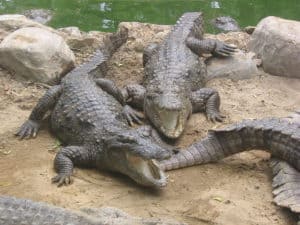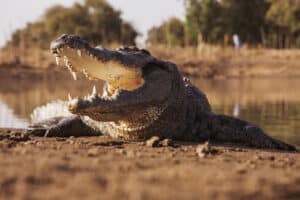Crocodiles are some of the coolest animals on the planet, if only for their dinosaur-like nature and appearance. They live all over the world and have proven themselves to be some of the most resilient and long-lasting species in the history of the world. Having been around (in some form) since the Triassic period (252 million years ago), they seem to be perfectly adapted. One of their strangest adaptions, however, is their ability to run! Let’s learn: Crocodile Speed: How Fast Can Crocodiles Run? It will likely surprise you!
Crocodile Speed: How Fast Can Crocodiles Run?
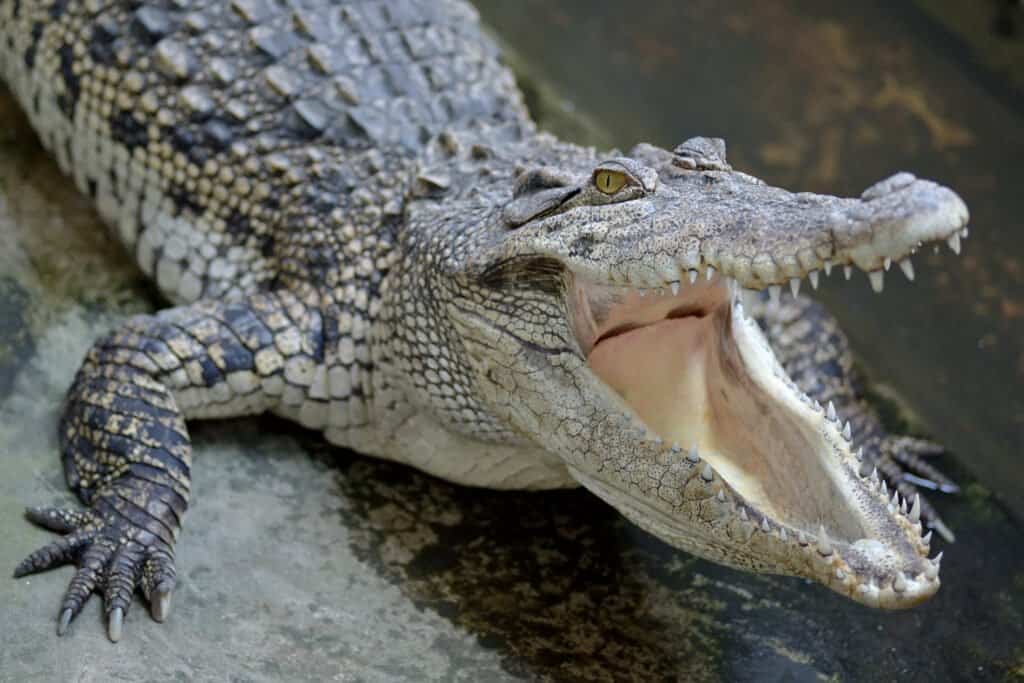
Crocodiles can sprint for short distances of speeds up to 22 mph.
©iStock.com/anakeseenadee
Crocodiles are often perceived as aquatic animals, and that would be mostly correct. Still, they occasionally need to venture onto land to move watering holes, lay eggs, or bask in the sun. When they are on land, are they still capable of being the quick and capable predators that they are in the water? Let’s find out.
Most sources claim that a crocodile can run, at full speed, up to 22 mph. Obviously, the size and species of crocodile will determine the specifics, but it’s clear that these dino-relatives aren’t slow-pokes on land by any means.
Saltwater crocodiles, generally the largest crocodiles in the world, can hit between 15-18 mph. The American crocodile is known to run at speeds of up to 20 mph, and the fastest crocodile, the Nile crocodile, can run between 19-22 mph. The size of the crocodile likely has a lot to do with their speed, but overall, crocodiles are pretty fast animals, especially for their size and aquatic disposition.
It’s important to remember, however, that they rarely move at these speeds. Most of the time, they move at speeds of 7- 10 mph when on dry land. If they were to try and run at their top speeds, it would only be for a second or two.
Can alligators run as fast as crocodiles?
American alligators are probably a little faster due to their size. There isn’t a lot of clear data, however, since some sources state that they can run up to 30 mph, while others claim significantly less, around 13 mph. It’s likely that they can run as fast as a human, probably around 15 mph at their top speed. It’s important to note that this is only in very short bursts. Alligators are not distance runners.
How can crocodiles run so fast?
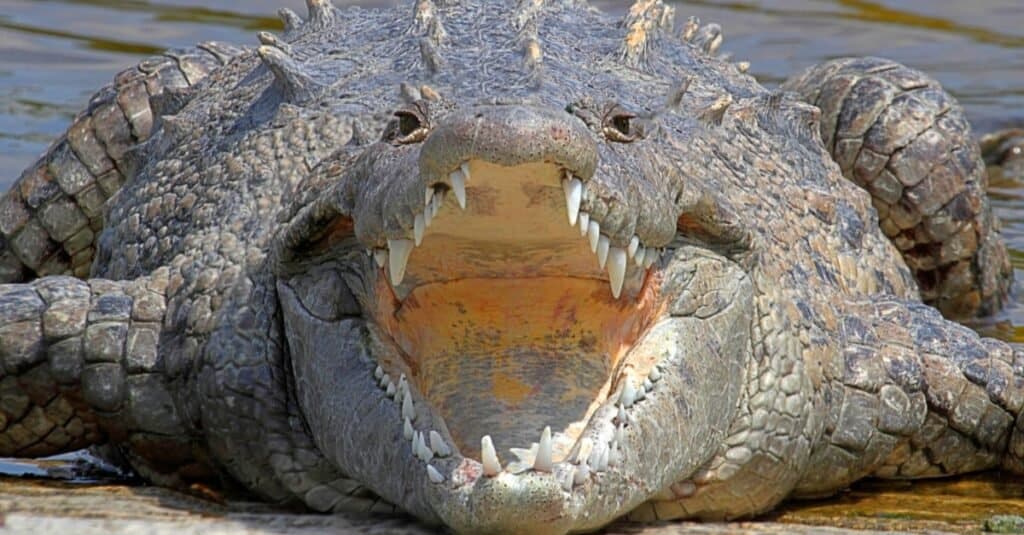
Crocodiles have three primary methods of locomotion: belly crawling, high walking, and galloping.
©iStock.com/SteveByland
There are three ways that crocodiles and alligators run: belly crawling, high walking, and galloping. Belly crawling is often done on slippery surfaces, like mud and sand. Using their legs to push themselves forward, it’s a slow way to move and keeps their legs splayed out to their sides. High walking is exactly how it sounds. With their feet and legs under their body, they walk forward with their tail and stomach lifted off the ground. The third way a croc or alligator can move is through a “gallop.” This is precisely what it sounds like and involves bounding forward with propulsion, bending forward and catching on the front legs, and then pulling the hind legs up to match and then repeating. The mannerism is similar to a horse or dog at full speed. Galloping isn’t often used as a method of locomotion since it’s tough and requires a lot of energy. It’s generally done only as a way to escape potential threats.
Why do crocodiles need to run fast?
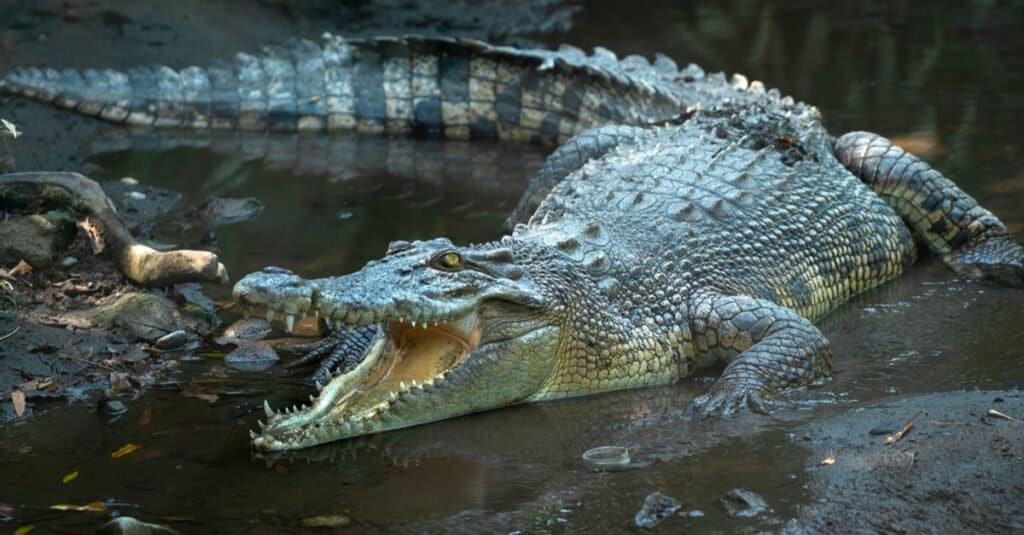
Crocodiles generally don’t chase prey, but will run towards water if they feel threatened.
©Pius Rino Pungkiawan/Shutterstock.com
Crocodiles rarely need to run fast on land. Most of their life is spent in the water and any time spent outside of it is usually spent basking in the sun. Additionally, crocodiles are ambush predators and always strike from the water. When they strike, they either never leave the water or only walk a few feet onto shore in order to grab prey. It’s possible that the high speeds (30 mph+) are referring to this semi-aquatic strike.
The most likely reason that a crocodile would run at speed is to get away from a potential threat. Crocs generally don’t want to be on land and will retreat towards the water when threatened. If a perceived predator or threat pressed a crocodile, it’s possible it would run towards the security of the water.
It is likely that galloping was used by now-extinct crocodyliforms as a means of hunting. Today’s crocs don’t use it for hunting but have kept the ability as a way to escape certain threats.
Can a crocodile outrun a human?
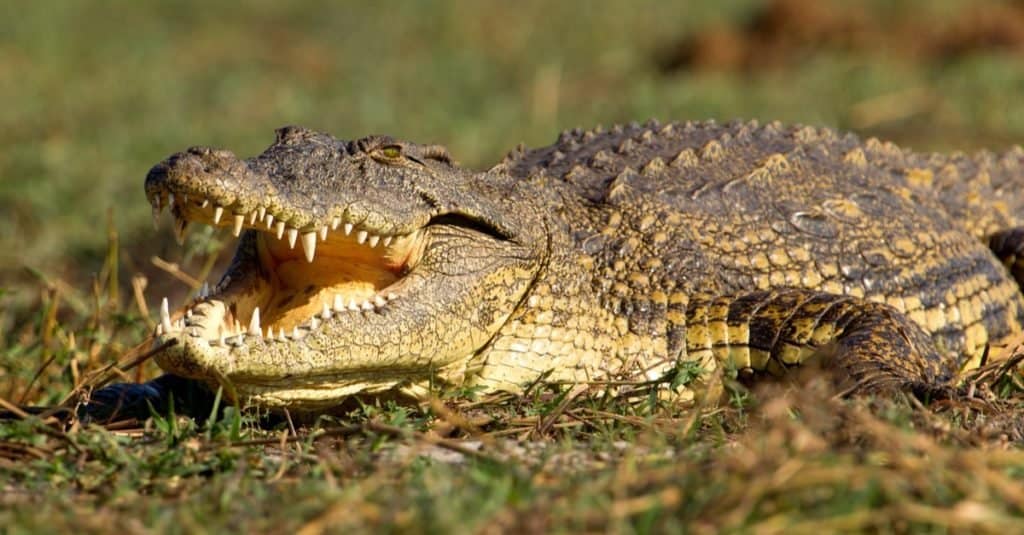
A human could likely outrun a crocodile in a sprint, provided they weren’t within immediate striking distance.
©Gaston Piccinetti/Shutterstock.com
Most crocodiles have no interest in chasing humans across large areas. As aquatic predators, they prefer to wait in the water for mammals and birds to come near the shore. If, however, a crocodile was to begin chasing you, could you outrun it? Let’s take a look.
Let’s assume that a motivated crocodile could run at 18 mph in a straight line for 20 meters. Most humans can sprint at 15 mph, but if motivated, they could likely hit 18-20. Where the real speed for crocs comes in is their acceleration. A crocodile can move an entire body length in a quarter of a second. After that, their speed tapers off significantly.
With all that information, there are two different scenarios that could happen. If you had a 5-10 meter head start, you could likely outrun and outdistance a crocodile who maxed out at 18 mph. If you were within 10-15 feet of a crocodile when it decided to chase you, however, things would be a lot closer. The crocodile could move well before you had time to react, probably making you have a really bad day in the process.
Overall, a crocodile isn’t faster than a scared human in most scenarios unless the human is initially within striking range.
The photo featured at the top of this post is © Mari Swanepoel/Shutterstock.com
Thank you for reading! Have some feedback for us? Contact the AZ Animals editorial team.



